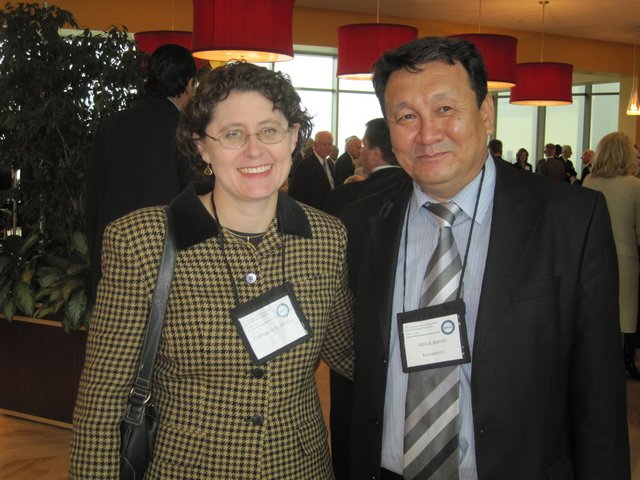The 2009 International Law and Religion Symposium

Newsletter of 19 October 2009
As we at the International Center for Law and Religion Studies reflect upon the just-concluded and very successful 16th Annual International Law and Religion Symposium, we wish to share a report of the conference with our many friends worldwide and to express our deep gratitude for those who traveled from 44 countries of Europe, Asia, Africa, the Middle East, North and South America, and the Pacific to be with us in Provo, Utah. “Connecting Communities of Discourse: How the Judiciary, Academia, Government and International Institutions Further the Work of Religious Freedom” was the subject of this year’s symposium, which brought together more than 80 scholars, judges, and government and religious leaders and many more hosts, visitors, and friends to discuss challenges and successes in implementing principles of freedom of religion or belief.
Symposium 2009 was marked by excellent presentations and stimulating interactions among delegates. The symposium convened on Sunday evening, 4 October 2009, in the J. Reuben Clark Law School’s Moot Court Room. Two exceptional keynote speakers brought tremendous insight and life experience to the topic. Anastasia Crickley, Chairperson of the European Union Fundamental Rights Agency, and The Honourable Pius Nkonzo Langa , Chief Justice of the South Africa Constitutional Court each drew on personal experiences to comment forcefully on the need for principled commitment to promote freedom and the need to consult and work together with others. “The experience of my country shows that even a country that has been the subject of oppression and violence may still perpetuate this on others,” stated Professor Crickley. “We’re not all the same, but we do share values, and defending the rights of people to practice their religion is defending rights for all.” Justice Langa, in describing the ways apartheid was practiced in South Africa, explained that “no single act of apartheid was committed outside of the law. Apartheid also relied on religion. The churches gave justification for the oppression of apartheid.” Since 1994, Justice Langa said, “the law has been made to work for justice.” But we know that “it is also possible for the law to serve other purposes,” and “it is for us to see to it that both the law and the people serve [the good].”
Also during the opening session, which was this year for the first time streamed live on the internet, ICLRS Director W. Cole Durham, Jr. presented the Distinguished Service Award for Religious Freedom. This year’s recipient was Senior Judge J. Clifford Wallace, Chief Judge Emeritus of the United States Court of Appeals for the Ninth Circuit.
After two days of outstanding presentations by the visiting delegates, the symposium concluded on Tuesday, 6 October, with remarks by Michael K. Young, President of the University of Utah, and by Professor Durham. President Young, who has broad experience serving with government and intergovernmental organizations, academic bodies, and NGOs, spoke of the importance of cooperation among groups to effectively promote religious freedom and the need for consistency on religious freedom issues within groups that may be seeking the benefits of religious freedom in one area but be dominant in another area.
It is difficult to give more than a small suggestion of the impressive people, stimulating interactions of ideas, and warm friendships developed at the conference. This special edition of the ICLRS Newsletter is devoted to brief reports of symposium events, which we hope will give some sense of this truly memorable conference. We have additional photographs, texts of symposium presentations, and links to audio and video recordings of the proceedings in several languages on the ICLRS website. We invite you to access this information, to view biographical sketches of this year’s participants, and to read of the ongoing work of the Center. Perhaps this work may be summed in a comment by the honorable delegate Musa Francis Ecweru, Minister of State for Relief, Disaster Preparedness and Refugees, Government of Uganda: “A society can be strong economically, and in military might, but if it is morally weak, if it lacks moral strength, it is doomed. Religion in a society gives moral strength.
We hope you enjoy this report. As always, we welcome your comments and questions.
Sincerely yours,
Elizabeth A. Sewell, Associate Director,
International Center for Law and Religion Studies,
J. Reuben Clark Law School, Brigham Young University